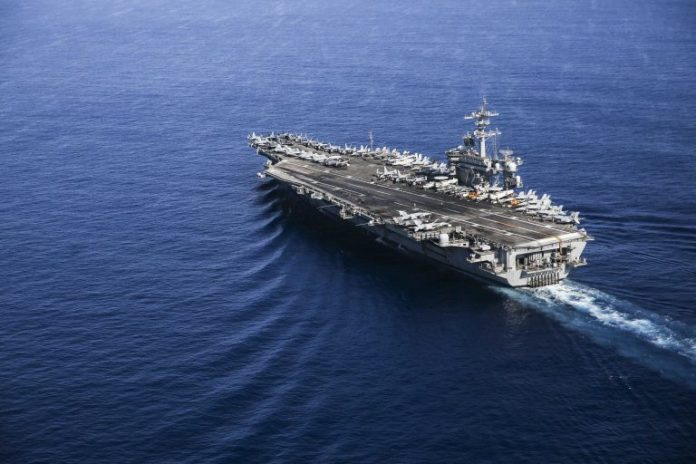This article was originally published on Jayu Press and translated by OKN Correspondent.
Amid speculation that North Korea could stage military provocations around major anniversaries, including the 110th birthday of Kim Il-Sung, the Ministry of National Defense reportedly rejected a request from the United States to conduct trilateral naval drills between South Korea, the U.S., and Japan.
Analysts say that the Japan Self-Defense Forces’ influence surrounding the Korean Peninsula is increasing as the trilateral naval exercises fell through, and the Japan Maritime Self-Defense Force conducting joint drills in international waters with the U.S. 7th Fleet’s nuclear-powered aircraft carrier the USS Abraham Lincoln (CVN-72, 100,00 tons).
According to a government source on April 14, the U.S. military is conducting joint exercises with Japan in the East Sea to coincide with North Korean anniversaries like the 110th birthday of Kim Il-Sung on April 15 and the 90th anniversary of the founding of the People’s Revolutionary Army on April 25. These joint exercises are a warning against the possibility of strategic provocations such as nuclear testing by North Korea.
Initially, the U.S. asked South Korea for a joint naval exercise with the carrier strike group, but the South Korean military refused. Also, it’s been reported that the South Korean military expressed disapproval of the request from the U.S. to conduct a trilateral maritime exercise between South Korea, the U.S., and Japan.
This can be interpreted as [the South Korean military] deeming that there is no need to provoke North Korea at a time when it hasn’t made additional provocations since the testing of an intercontinental ballistic missile (ICBM) on March 24. However, it’s being reported that South Korea and the U.S. have prepared a plan to jointly respond by developing American strategic assets on the Korean Peninsula if North Korea makes another “serious provocation” in the future.
The U.S. 7th Fleet released photos of the U.S.-Japan joint maritime exercises through Facebook and Twitter on April 12, sending a message of warning to North Korea, which has been showing signs of preparing for a nuclear test. According to the 7th Fleet’s operations command, the USS Lincoln, the missile cruiser USS Mobile Bay (CG-53), and the Aegis destroyer USS SPRUANCE (DDG-111) held joint exercises with the Japan Maritime Self-Defense Force’s guided-missile destroyer JS Kongo (DDG-173) and the JS Inazuma (DD-105).
The two navies sailed in formation in the East Sea, and the USS Lincoln’s F-35C stealth fighter jets and the E-2D Hawkeye also flew in formation over the East Sea with JMSDF’s fighter jets. Regarding this bilateral exercise, the 7th Fleet explained, “Routine bilateral operations like this one is to reassure our allies and partners of the U.S. commitment to maintaining a free and open Indo-Pacific.”
Through this exercise, the U.S. stressed the nature of the armed demonstration against North Korea as well as keeping China in check and expressed its intention to show deterrence against North Korea. However, experts say that this has gone straight towards expanding Japan’s influence surrounding the Korean Peninsula.
It can be analyzed that the U.S. now, especially, has increased its expectations of Japan since the South Korean military refused trilateral maritime exercises, and Japan has shown its willingness to actively participate in crisis management and operations of the Korean Peninsula. On the other hand, the South Korean military is said to have failed to show consistent pressure on the North in terms of its strategy. This can serve as a gauge of the trust between allies as well as the ability to take responsibility for the fate of the Korean Peninsula in a state of emergency.
Of course, South Korea and the U.S. announced that they will hold a preliminary crisis management staff training (CMST) from April 12 to 15 and will hold a Combined Command Post Training (CCPT) from April 18 to 28. However, experts say that the refusal to hold ROK-U.S.-Japan trilateral maritime drills on the grounds of the shaky ROK-Japan relations amid heightened security threats on the Korean Peninsula can be understood as transferring responsibility for crisis management on the Korean Peninsula that needs to be paid attention to.
To read the original article in Korean, please click here.


